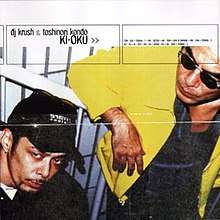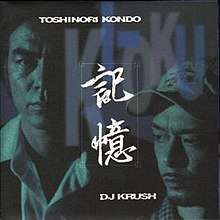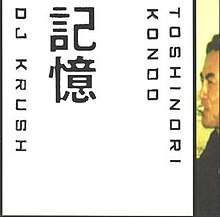Ki-Oku
Ki-Oku (記憶, Kioku) is a collaborative studio album by Japanese hip hop producer DJ Krush and Japanese jazz trumpeter Toshinori Kondo. It was released on August 8, 1996 by Sony Music Entertainment in Japan[1] and on January 26, 1998 by R&S Records overseas.[2]
| Ki-Oku | ||||
|---|---|---|---|---|
 | ||||
| Studio album by | ||||
| Released | August 8, 1996 | |||
| Genre | ||||
| Length | 56:44 | |||
| Label | ||||
| Producer |
| |||
| DJ Krush chronology | ||||
| ||||
| Alternate cover | ||||
 Japanese edition album cover | ||||
| Alternate cover | ||||
 European edition album cover | ||||
The album peaked at number 12 on the UK Independent Albums Chart.[3]
Production
Ki-Oku consists of 10 proper tracks and 3 short interludes. It also features a cover of "Sun Is Shining", which was originally written and performed by Bob Marley.
So far, it has been their only collaboration and neither musician has revealed plans for a second album.
Critical reception
| Review scores | |
|---|---|
| Source | Rating |
| AllMusic | |
| The Guardian | |
| Muzik | 9/10[5] |
Rick Anderson of AllMusic gave the album 4 stars out of 5, saying, "This is one of those albums that reveals more with repeated listens; if it sounds too easy at first, listen again -- there's lots of interesting stuff going on beneath what sometimes sounds like a merely pleasant surface."[2]
In 2015, Fact placed the album at number 25 on its list of "The 50 Best Trip-Hop Albums of All Time".[6]
Track listing
All tracks are written by DJ Krush and Toshinori Kondo, except "Sun Is Shining" by Bob Marley.
| No. | Title | Length |
|---|---|---|
| 1. | "Toh-Sui" | 4:57 |
| 2. | "Tobira-1" | 0:35 |
| 3. | "Mu-Getsu" | 6:19 |
| 4. | "Ha-Doh" | 5:24 |
| 5. | "Sun Is Shining" | 6:52 |
| 6. | "Mu-Chu" | 6:28 |
| 7. | "Tobira-2" | 0:45 |
| 8. | "Fu-Yu" | 4:56 |
| 9. | "Ki-Gen" | 4:40 |
| 10. | "Ko-Ku" | 5:23 |
| 11. | "Shoh-Ka" | 4:39 |
| 12. | "Bu-Seki" | 4:58 |
| 13. | "Tobira-3" | 0:44 |
Personnel
Credits adapted from liner notes.
- DJ Krush – beats, programming, scratches
- Toshinori Kondo – acoustic trumpet, electric trumpet
Charts
| Chart (1998) | Peak position |
|---|---|
| UK Albums (OCC)[7] | 155 |
| UK Independent Albums (OCC)[3] | 12 |
References
- "記憶~KI-OKU~". Oricon (in Japanese). Retrieved May 15, 2017.
- Anderson, Rick. "Ki-Oku – DJ Krush / Toshinori Kondo". AllMusic. Retrieved June 21, 2011.
- "Official Independent Albums Chart Top 50". Official Charts Company. Retrieved May 15, 2017.
- Glaister, Dan (January 23, 1998). "DJ Krush and Toshinori Kondo: Ki-Oku (R&S)". The Guardian.
- Wyatt, Kieran (February 1998). "Toshinori Kondo & DJ Krush: Ki-Oku (R&S)". Muzik. No. 33. p. 69.
- Twells, John; Fintoni, Laurent (July 30, 2015). "The 50 best trip-hop albums of all time". Fact. Retrieved December 22, 2016.
- "Chart Log UK: Alex K – Kyuss". Zobbel.de. Retrieved January 10, 2019.